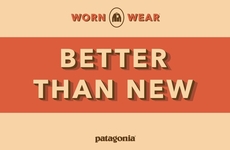
Project Repat Sells Used T-Shirts for a Good Cause
Christopher DeLuca — May 29, 2011 — Eco
References: projectrepat.org & netted.net
The idea behind Project Repat is a simple yet brilliant one: find the best secondhand T-shirts and sell them to people who love irony and that frayed aesthetic. The company is innovative in that it is a nonprofit that uses the profits made from the sale of T-shirts to donate to good causes.
Project Repat washes every shirt twice before any sale and stamps its logo on the fabric before sending it out the door. Project Repat is pushing the boundaries and thinking outside the box when it comes to giving back. The success of Project Repat is driven by its original business model and its ability to appeal to the desire for secondhand clothing.
Contact Information
Project Repat website
Project Repat on Twitter
Project Repat onFacebook
Project Repat washes every shirt twice before any sale and stamps its logo on the fabric before sending it out the door. Project Repat is pushing the boundaries and thinking outside the box when it comes to giving back. The success of Project Repat is driven by its original business model and its ability to appeal to the desire for secondhand clothing.
Contact Information
Project Repat website
Project Repat on Twitter
Project Repat onFacebook
Trend Themes
1. Socially Conscious Secondhand Clothing - Project Repat's innovative business model of selling used T-shirts to donate to good causes is disrupting the fashion industry.
2. Circular Economy - Project Repat promotes sustainability by giving new life to old clothes, creating an opportunity for disruptive innovation in the textile and fashion industries.
3. Nonprofit E-commerce - Project Repat's profitable business model rooted in charity work provides a new approach for nonprofits to generate revenue through e-commerce.
Industry Implications
1. Textile Industry - Project Repat's upcycled T-shirts challenge traditional textile production and present opportunities for innovative circular economy business models.
2. Fashion Industry - Project Repat's emphasis on secondhand clothing and sustainability presents an innovation opportunity for a new wave of eco-friendly fashion brands.
3. Nonprofit Sector - Project Repat's unique business model, combining business and philanthropy, could disrupt the traditional fundraising model for nonprofit organizations.
1.2
Score
Popularity
Activity
Freshness























